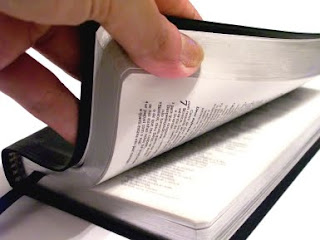“Declare his glory among the nations, his marvelous works among all the peoples!”
(Psalms 96:3 ESV)

The Bible is not just a book. It is a book of books... made up of many writings by different writers, from different ages and different cultural settings. That's all it is from most non-religious points of view.
But from the Christian's perspective, the Bible is the Book of books, because it is the very Word of God (1 Thes 2:13; 2 Tim 3:16)! It is God's message to humankind in the timeless form of writing, so that all people around the world are able to understand it if they have access to a good translation. Ancient Scripture certainly must be understood in light of the time and culture in which it was originally written, but a lack of that knowledge should not stop any of us from perceiving the main subject and theme.
God is the main subject of the Bible, and the theme is his glory. Sure, it does focus on many different characters, such as Abraham and his wife, Sarah; their son, Isaac; Jacob; Jacob's family; Moses and the Israelites; Jesus and his apostles, and so on. However, it is God who constantly makes himself known to every new generation throughout Biblical history. As God was revealing himself to his people through his Word, those who were called were able to know him more intimately and were changed by that experience of knowing him.
This is why we must read the Bible: to know God as he has revealed himself in Scripture as Father, Son and Holy Spirit. How we read the Bible will determine whether we know him rightly. As Peter said, there are those who, because of their ignorance, twist the Scriptures to their own destruction (2 Peter 3:16). Christians, of all people, should be the most careful and humble of its readers.
We don't read everything in the same way. We don't read the newspaper like we read a text book, or a historical biography as if it were a fictitious novel. There are certain things we need to know before we begin reading anything. We need to know what we are reading and why it was written.
When you pick up a newspaper, you already know that it's a newspaper, and you know what it is intended for as a whole--to inform you about the news. It is a compilation of different kinds of literature, such as reports, articles, advertisements, announcements, and entertainment, which are intended to provide readers with a variety of news, facts, opinions, entertainment, coupons, and other information. You don’t read every section of the newspaper in the exact same way, but you take into account the differences in type of literature and purpose. We must do the same with the Bible.
By understanding what kind of book the Bible is and what it intended to make known to its original readers, things become significantly clearer to us. Learning these basic facts isn't hard if you have some basic information available. People often go wrong when they fail to take some of that information into account. We’ll look at ways that often happens later.
You can find helpful information about the Bible in study Bibles, Bible dictionaries, Bible encyclopedias and Bible handbooks (all of which can be accessed free on the Internet). They can help provide you with historical background to what you are reading, as well as other important facts to help you better understand Scripture. Such tools are meant to assist, not hinder your reading of God's Word. Wise disciples should put them to good use, seeking to handle God's Word with great care (Prov 18:15; 1 Tim 1:6-8; 2 Tim 2:15; 3:15).